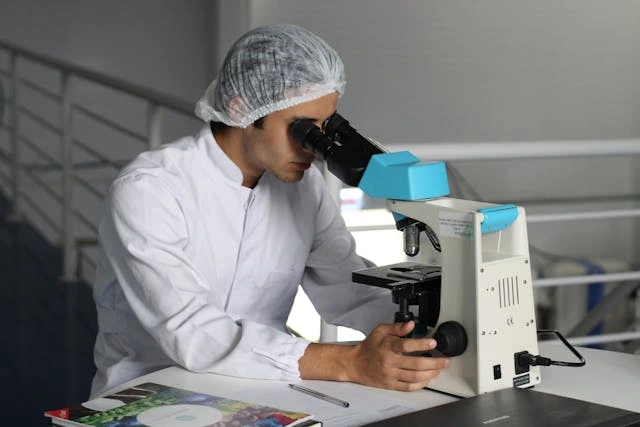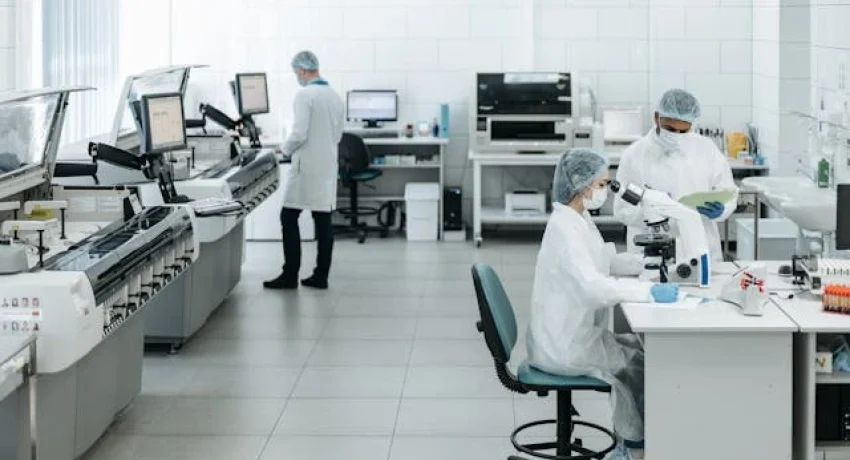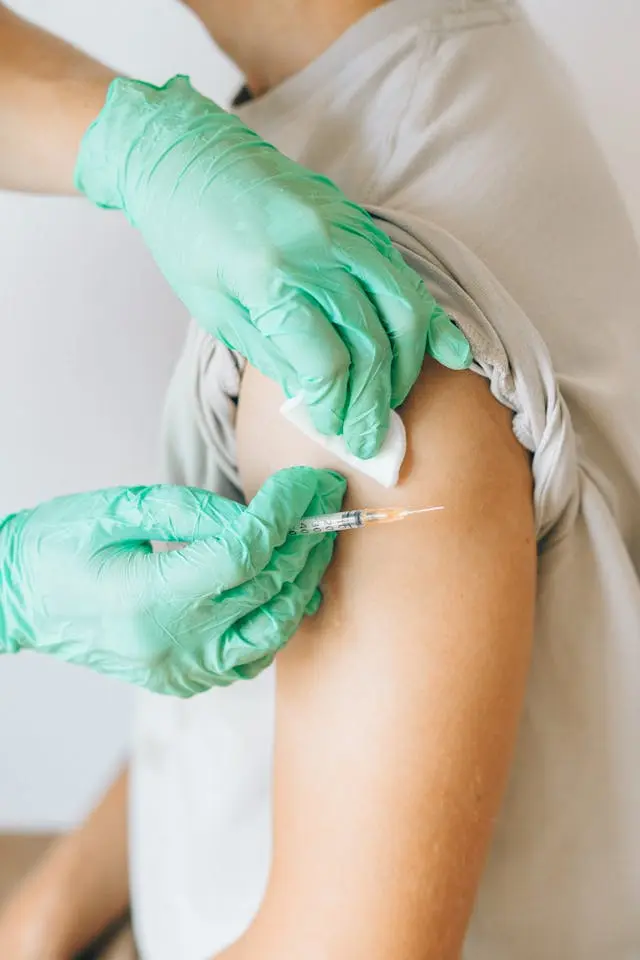BIOTECHNOLOGY AND HEALTH TECH

The intersection of biotechnology and health tech is one of the most dynamic and transformative areas in modern medicine. Over the past few decades, advancements in biotechnology, alongside innovations in health technology, have already had a profound impact on our understanding of health and disease. From gene editing and personalized medicine to AI-driven health diagnostics and wearable health tech, these breakthroughs are set to revolutionize the healthcare industry in ways that were once unimaginable. In this article, we will explore how the convergence of these fields is paving the way for a new era of healthcare—one that is more personalized, data-driven, and preventative.
BIOTECHNOLOGY AND HEALTH TECH: REVOLUTIONIZING HEALTHCARE THROUGH INNOVATION
1. Biotechnology: Pushing the Boundaries of Medicine
Biotechnology is a field of science that uses biological systems, organisms, or derivatives to develop or create products that can improve human health. In healthcare, biotechnology has made significant strides in areas such as genetic engineering, drug development, and vaccine production. The most notable advancements in biotechnology in recent years have come from gene editing, the development of personalized medicine, and the use of biotechnology in the treatment of complex diseases.
1.1 Gene Editing: The Dawn of Precision Medicine
One of the most groundbreaking developments in biotechnology is gene editing, particularly the CRISPR-Cas9 technique. CRISPR (Clustered Regularly Interspaced Short Palindromic Repeats) is a powerful tool that allows scientists to make precise alterations to DNA by adding, deleting, or modifying specific genes. This technology has the potential to treat or even cure genetic disorders by correcting the mutations that cause these conditions.
The application of gene editing in healthcare holds immense promise, particularly for genetic diseases that currently have no cure, such as cystic fibrosis, sickle cell anemia, and muscular dystrophy. Through the use of CRISPR, scientists have been able to correct mutations in the genes of living organisms, including humans, opening the door to potential cures for many inherited conditions.
- Gene Therapy: One of the primary applications of gene editing is gene therapy, which involves replacing or repairing defective genes in patients. This could provide long-term or permanent cures for diseases like hemophilia, retinitis pigmentosa, and thalassemia. For example, in clinical trials, CRISPR has been used to edit the genes of patients with sickle cell anemia, resulting in promising improvements in their health.
- Ethical Considerations: While gene editing holds tremendous potential, it also raises significant ethical concerns, particularly in relation to germline editing (modifying the genes in human embryos or reproductive cells). These concerns include the possibility of unintended consequences, ethical dilemmas regarding “designer babies,” and the potential for unequal access to gene-editing technologies.
- Precision Medicine: Gene editing is a key component of precision medicine, which tailors medical treatments to individual patients based on their genetic makeup. Rather than using a one-size-fits-all approach, precision medicine allows for more targeted therapies that are more likely to be effective and have fewer side effects.
1.2 Personalized Medicine: A Tailored Approach to Treatment
The concept of personalized medicine—also known as precision medicine—is revolutionizing the way diseases are treated. Personalized medicine involves using genetic, environmental, and lifestyle information about a patient to develop customized treatment plans. This approach allows healthcare providers to choose the most appropriate treatment options based on an individual’s unique genetic profile, rather than using standard treatments that may not work for everyone.
- Genomic Sequencing: Advances in genomic sequencing have made it possible to map an individual’s entire genome at a relatively low cost. By analyzing the genetic variations present in a person’s DNA, doctors can identify specific risk factors for diseases and determine which medications or treatments will be most effective for them.
- Targeted Therapies: Personalized medicine has led to the development of targeted therapies that specifically target the genetic mutations responsible for certain diseases. This is particularly important in the treatment of cancer, where targeted therapies can be used to attack cancer cells without damaging healthy tissues. For example, Herceptin, a targeted therapy for breast cancer, works by targeting the HER2 protein, which is overexpressed in some types of breast cancer.
- Pharmacogenomics: Pharmacogenomics is the study of how an individual’s genetic makeup influences their response to drugs. By incorporating pharmacogenomic data into treatment plans, doctors can prescribe medications that are more likely to be effective and avoid those that may cause harmful side effects.
- Early Detection and Prevention: Personalized medicine also enables earlier detection of diseases through genetic screening and risk assessments. For example, individuals with a family history of certain cancers may undergo genetic testing to determine their risk of developing the disease. By identifying genetic predispositions early on, doctors can implement preventive measures or monitor patients more closely for signs of the disease.
1.3 Biotechnology and Disease Treatment
Beyond gene editing and personalized medicine, biotechnology is also playing a crucial role in the development of new treatments for complex diseases, such as cancer, Alzheimer’s disease, and autoimmune disorders. Researchers are exploring the use of biologics, monoclonal antibodies, and immunotherapy to treat conditions that were once considered untreatable.
- Immunotherapy: Immunotherapy is a cutting-edge treatment that harnesses the body’s immune system to fight cancer. Unlike traditional cancer treatments such as chemotherapy and radiation, which can damage healthy cells, immunotherapy works by stimulating the immune system to specifically target cancer cells. CAR T-cell therapy, a type of immunotherapy, has shown remarkable success in treating certain types of blood cancers, such as leukemia and lymphoma.
- Biologics and Monoclonal Antibodies: Biologics are a class of drugs made from living organisms that are used to treat a wide range of conditions, including rheumatoid arthritis, diabetes, and cancer. Monoclonal antibodies, a type of biologic, are designed to target specific proteins in the body and have been used to treat diseases such as Crohn’s disease and breast cancer.
2. Health Tech: Leveraging Technology for Better Health Outcomes
Alongside advances in biotechnology, health tech is playing an increasingly important role in improving healthcare delivery, patient outcomes, and disease prevention. Health tech refers to the use of technology to enhance healthcare systems and services, from AI-driven diagnostics to wearable health devices.
2.1 AI-Driven Health Diagnostics
Artificial intelligence (AI) is transforming healthcare by enabling faster, more accurate diagnoses. AI algorithms are being used to analyze vast amounts of medical data, such as imaging scans, lab results, and patient records, to identify patterns and predict outcomes. This technology can help doctors make more informed decisions, detect diseases earlier, and reduce human error.
- Medical Imaging: AI is being used to analyze medical imaging data, such as X-rays, CT scans, and MRIs, to detect abnormalities like tumors, fractures, or lesions. For example, AI-powered systems like DeepMind’s AlphaFold have demonstrated the ability to predict protein folding, a key component in understanding diseases like Alzheimer’s and cancer.
- Diagnostic Assistance: AI algorithms can also be used to assist in diagnosing diseases by analyzing patient symptoms, medical histories, and genetic data. Tools like IBM Watson Health are already being used by healthcare providers to analyze clinical data and suggest potential diagnoses or treatment plans.
- Predictive Analytics: AI can predict disease outbreaks and track public health trends by analyzing large datasets. For instance, AI models can analyze environmental factors, demographics, and social media activity to predict the spread of infectious diseases such as the flu or COVID-19.
2.2 Wearable Health Tech: Monitoring Wellness in Real-Time
Wearable health technology, such as smartwatches, fitness trackers, and health sensors, is becoming a mainstream part of wellness monitoring. These devices provide continuous, real-time data on key health metrics, such as heart rate, blood pressure, sleep patterns, and physical activity. Wearables not only help individuals track their health and fitness goals but also enable healthcare providers to monitor patients remotely, improving outcomes and reducing hospital visits.
- Smartwatches and Fitness Trackers: Devices like the Apple Watch and Fitbit have become popular for tracking fitness activities, monitoring heart rate, and even detecting irregularities like atrial fibrillation (AFib). These devices are equipped with sensors that track movement, sleep, and other health metrics, providing users with actionable insights to improve their health.
- Remote Patient Monitoring: Wearable health tech can be used for remote patient monitoring (RPM), allowing healthcare providers to track a patient’s health data without the need for in-person visits. RPM is particularly beneficial for patients with chronic conditions like diabetes, hypertension, or heart disease, as it allows for continuous monitoring and early detection of potential health issues.
- Personalized Health Management: Wearables can provide personalized health recommendations based on the data collected. For example, a fitness tracker can suggest workout routines or sleep habits tailored to an individual’s needs, while a smartwatch can alert users to potential health concerns such as high blood pressure or irregular heart rhythms.
- Telemedicine Integration: Wearable health tech can also integrate with telemedicine platforms, allowing patients to consult with doctors remotely while sharing real-time health data. This is particularly useful for individuals living in rural or underserved areas who may have limited access to healthcare facilities.
3. The Future of Biotechnology and Health Tech
As we look to the future, the integration of biotechnology and health tech will continue to shape the healthcare landscape in profound ways. The combination of AI, genetic research, wearable devices, and personalized treatments will likely lead to:

- Better Disease Prevention: With more advanced diagnostic tools and personalized health monitoring, doctors will be able to predict and prevent diseases before they develop, improving overall public health outcomes.
- Increased Accessibility: As wearable health devices become more widespread, and telemedicine becomes more integrated into the healthcare system, patients will have greater access to healthcare services, regardless of their location.
- Improved Outcomes: Personalized medicine, AI-driven diagnostics, and continuous health monitoring will result in more effective treatments, faster recovery times, and ultimately better patient outcomes.
- Ethical and Privacy Considerations: As biotechnology and health tech continue to advance, ethical issues surrounding data privacy, genetic modification, and accessibility will need to be addressed to ensure these technologies benefit everyone in society.
In conclusion, the combined impact of biotechnology and health tech is poised to revolutionize healthcare, making it more personalized, data-driven, and accessible. From gene editing and AI diagnostics to wearable health tech









